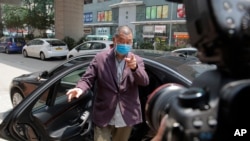Two months after China’s national security law took effect in Hong Kong, the city is scrambling to adjust to a new normal.
Government raids on newspapers began on August 10, when dozens of uniformed officers showed up the Apple Daily, a local newspaper. Early in the morning, they arrested Jimmy Lai, a pro-democracy media mogul and owner of Next Digital, the Apple Daily parent company, on charges of fraud and collusion with a foreign power, an offense prescribed by the new national security law.
The move against Lai and Apple Daily came a week after the United States placed sanctions on Carrie Lam, the Hong Kong chief executive, and 10 other security and government officials for “undermining Hong Kong’s autonomy and restricting the freedom of expression or assembly of the citizens of Hong Kong.”
Next Digital’s CEO Kim-hung Cheung, CFO Royston Chow and COO Tat-kuen Chow were also apprehended. Lai and the executives were released on bail.
Authorities issued a warrant for Mark Simon, Lai’s right-hand man and an American citizen who is now in the U.S. with his assets frozen in Hong Kong. Simon, who considers Hong Kong home after two decades of residency, said he wouldn't return.
"Hong Kong is my home of choice. In other words, I love Hong Kong. It literally depresses me to know that I can't go back there for maybe quite a long time,” he told VOA Mandarin in an exclusive interview.
Returning would mean legal troubles that Simon called “a distraction” for everyone, something he doesn’t want.
Protests began last year over China’s extradition proposal. The legislation would have allowed some criminal suspects to be sent to mainland China for trial.
Hong Kongers feared the bill would expose them to China’s politicized court system, where a trial almost always ends with a conviction.
China's Communist Party accused the U.S. and other Western countries of meddling in Hong Kong's affairs.
"Unfortunately, some Hong Kong residents have been hoodwinked by the opposition camp and their foreign allies into supporting the anti-extradition campaign," said an English language editorial in the official China Daily, the day after hundreds of thousands had jammed Hong Kong’s streets on June 9, 2020, to protest against the extradition bill.
But after the bill was withdrawn, the protests continued as Hong Kongers from all walks of life pushed for direct elections, among other pro-democracy elements such as a free press.
Simon did not support Westerners participating in the demonstrations. He said he attended rallies to “keep an eye on” Lai, a man Simon described as a colleague, friend and family member after working for him for 20 years.
“I think I went on about four or five of the marches that Jimmy's been on in the last year or so in the fall, largely because we were getting a lot of reports that somebody was going to try to do something physical,” he said.
He said the threats were not surprising as Lai was regularly under surveillance by unknown individuals and the pro-Beijing media.
“Mr. Lai’s House has 24/7 people out there watching,” Simon said. “You might come over for a dinner party, you have your picture taken.”
Increased surveillance
Simon said he was also watched. He responded by moving his family back to the U.S. to avoid being harassed.
“I lived a life under heavy surveillance when I was in Hong Kong. I was followed on a fairly regular basis,” he told VOA Mandarin.
This type of surveillance has intensified since the new law went into effect June 30, according to pro-democracy activists who have complained of being stalked by unknown individuals.
Activists are increasingly fearful of being detained. Last month, Joshua Wong, founder of political party Demosisto, and Agnes Chow, also of Demosisto, were arrested, as was Andy Chan, a founder of the pro-independence Hong Kong National Party. Charges ranged from suspicion of "organizing unorganized assembly" and "knowingly participating in unauthorized assembly” to “attacking police.”
More and more Hong Kongers have fled the city, among them the veteran pro-democracy activist Nathan Law.
China’s marine police detained 12 people near Ninepin Islands on a speedboat headed to Taiwan on August 23. Authorities charged those on board with unlawfully crossing a national border, according to the Guangdong Coast Guard’s official account on Weibo, China’s version of Twitter.
Hong Kong activist Andy Li was among those arrested, according to local media, and the others arrested are believed to be Hong Kong activists.
Meanwhile, Western governments are considering ways to help Hong Kongers.
Last month, the British government updated its immigration guidelines. The new rules offer some 3 million British National Overseas passport holders from Hong Kong an extended visa-free residency before requiring the submission of an application for the new special visa that provides a pathway to citizenship.
Hong Kong, which used to be a British colony, reverted to China in 1997. Hong Kongers born before then are eligible to apply for a British National Overseas passport.
Simon believes that the U.S. government also has a moral responsibility to help those who want to leave Hong Kong.
“We used to say the Jews who came over after World War II were Hitler's gift to America. We received all these incredible talents," he said. "The Hong Kong people that come to the U.S., or go to the U.K. or Australia, that's Xi Jinping's gift to the world."




